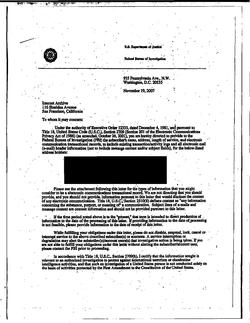A national security letter (NSL) is an administrative subpoena issued by the United States government to gather information for national security purposes. NSLs do not require prior approval from a judge. The Stored Communications Act, Fair Credit Reporting Act, and Right to Financial Privacy Act authorize the United States government to seek such information that is "relevant" to an authorized national security investigation. By law, NSLs can request only non-content information, for example, transactional records and phone numbers dialed, but never the content of telephone calls or e-mails.[1]
NSLs typically contain a nondisclosure requirement forbidding the recipient of an NSL from disclosing the FBI had requested the information.[2] The Director of the FBI must authorize the nondisclosure provisions and only after he or she certifies "that otherwise there may result a danger to the national security of the United States; interference with a criminal, counterterrorism, or counterintelligence investigation; interference with diplomatic relations; or danger to the life or physical safety of any person."[3] Nonetheless, the recipient of an NSL may challenge the nondisclosure provision in federal court.[4]
The constitutionality of such nondisclosure provisions has been repeatedly challenged. The nondisclosure provision was initially ruled unconstitutional as an infringement of free speech in Doe v. Gonzales, but that decision was vacated in 2008 by the Second Circuit Court of Appeals when it held the USA PATRIOT Improvement and Reauthorization Act gave the recipient of an NSL that included a nondisclosure provision the right to challenge the nondisclosure provision in federal court. In March 2013, a federal judge in the Northern District of California held an NSL nondisclosure provision was unconstitutional. On August 24, 2015, the Ninth Circuit Court of Appeals vacated the lower court's decision and remanded the case for further proceedings. On remand, the district court held the "NSLs were issued in full compliance with the procedural and substantive requirements suggested by the Second Circuit in John Doe, Inc. v. Mukasey, 549 F.3d 861 (2d Cir. 2008), which had held that the 2006 NSL law could be constitutionally applied"... and "the NSL law, as amended [by the USA FREEDOM ACT of 2015], was constitutional." The two petitioners appealed. On appeal, the Ninth Circuit Court of Appeals upheld the district court ruling, holding that NSLs are constitutional and stated, "the nondisclosure requirement does not run afoul of the First Amendment." Under Seal v. Jefferson B. Sessions, III, Attorney General, Nos. 16-16067, 16-16081, and 16-16082, July 17, 2017.
- ^ USA PATRIOT Improvement and Reauthorization Act of 2005: A Legal Analysis Congressional Research Service's report for Congress, Brian T. Yeh, Charles Doyle, December 21, 2006.
- ^ Bustillos, Maria (June 27, 2013). "What It's Like to Get a National-Security Letter". The New Yorker.
- ^ 18 U.S.C. § 2709(c)
- ^ 18 U.S.C. § 3511

